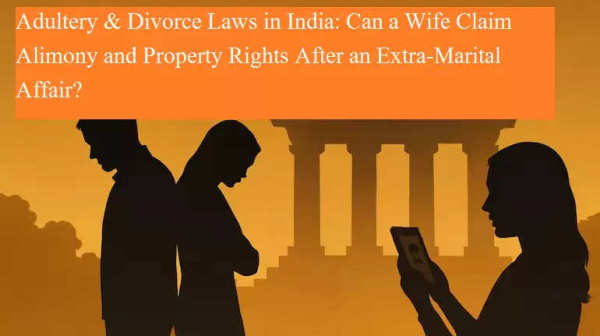
The recent ColdplayGate scandal involving a tech CEO and his HR head has reignited public debate over extra-marital relationships and how they impact divorce, alimony, and property rights under Indian law. As social media platforms buzz with speculation about infidelity and its consequences, the legal landscape in India offers some critical insights into what happens when a marriage faces betrayal.
What Sparked the Debate?
The controversy began when Andy Byron, CEO of unicorn tech company Astronomer, and the firm’s HR chief Kristin Cabot were spotted sharing an intimate moment during a Coldplay concert in July 2025. The video, captured on the venue’s "kiss cam," quickly went viral. Public curiosity intensified when Byron’s wife, Megan Kerrigan, removed his surname from her social media profiles—fueling speculation of a rift or separation.
The video and the subsequent online reaction sparked a trending hashtag, #ColdplayGate, but the conversation has now moved beyond celebrity gossip. It has led to a broader legal discussion: what does Indian law say about adultery, and how does it affect alimony and property settlements during divorce?
Is Adultery a Crime in India?
In 2018, the Supreme Court of India decriminalized adultery through the landmark Joseph Shine vs. Union of India case. While adultery is no longer a criminal offense, it still holds weight in civil matters—especially divorce proceedings. A spouse can still file for divorce on the grounds of infidelity.
According to Supreme Court lawyer Tushar Kumar, "Although adultery is no longer punishable by law, it can be a significant factor in civil cases such as divorce and alimony settlements. Courts often take a more lenient view toward the innocent party."
Alimony: How Does Infidelity Affect Maintenance?
Indian courts do not have a fixed formula for determining alimony. However, in most cases, the amount ranges between 25% and 33% of the husband's net monthly income. Factors such as the length of the marriage, the presence of children, and the nature of the spouse’s conduct can influence the final amount.
“If the husband is found guilty of adultery, the court usually awards more generous alimony to the wife,” says Kumar. On the other hand, if the wife is found to have committed adultery, her claim to permanent alimony may be dismissed altogether under Section 25(3) of the Hindu Marriage Act.
Can a Cheating Wife Be Denied Alimony?
Yes—provided there is substantial proof. Legal expert Alay Razvi explains, “If a wife is proven to be in an extra-marital relationship, the court can deny or revoke permanent alimony.” However, it must be backed by solid evidence such as witnesses, photographs, or communication records. Mere suspicion or rumors are not enough.
Temporary or interim alimony, however, may still be granted under Section 24 if the wife is financially dependent—even if the court later denies permanent maintenance due to proven adultery.
Property Division: Does Morality Matter?
Unlike Western countries that follow a 50:50 community property model, India does not automatically divide marital assets equally. Instead, Indian courts consider legal ownership and financial contribution.
“Courts look at who paid for the property or whose name it is registered under. Morality, like infidelity, rarely affects property division,” adds Razvi.
That said, in cases where property was purchased jointly or where the wife contributed significantly, she can claim her share. But if she’s not listed as a co-owner or has not contributed financially, she may not have a legal claim—even if her spouse was unfaithful.
Final Takeaway: Legal Grounds Over Moral Judgments
Adultery may no longer be a criminal act, but it continues to shape divorce settlements in India. While it may not impact property division directly, it has a considerable bearing on alimony. The burden of proof lies with the spouse making the accusation, and courts require evidence that meets the “preponderance of probability” standard.
As ColdplayGate continues to make headlines, the scandal is a reminder that the legal system separates personal morality from legal entitlements—but only up to a point. In a country where marriage is both a legal and cultural institution, the consequences of infidelity can be both emotionally and financially significant.
-
Make sago milkshake, easy recipe and benefits in 5 minutes for energy in Sawan Monday fast

-
5 Quiet Ways Frugal People Make Their Lives Feel Rich That Cheap People Haven’t Quite Mastered

-
The Tarot Horoscope Has A Message For Your Zodiac Sign On July 22

-
5 Smart Kitchen Appliances You Should Add To Your Counter (According To Users)

-
Railway’s big step: AI cameras will be installed at 7 railway stations including New Delhi to protect women
